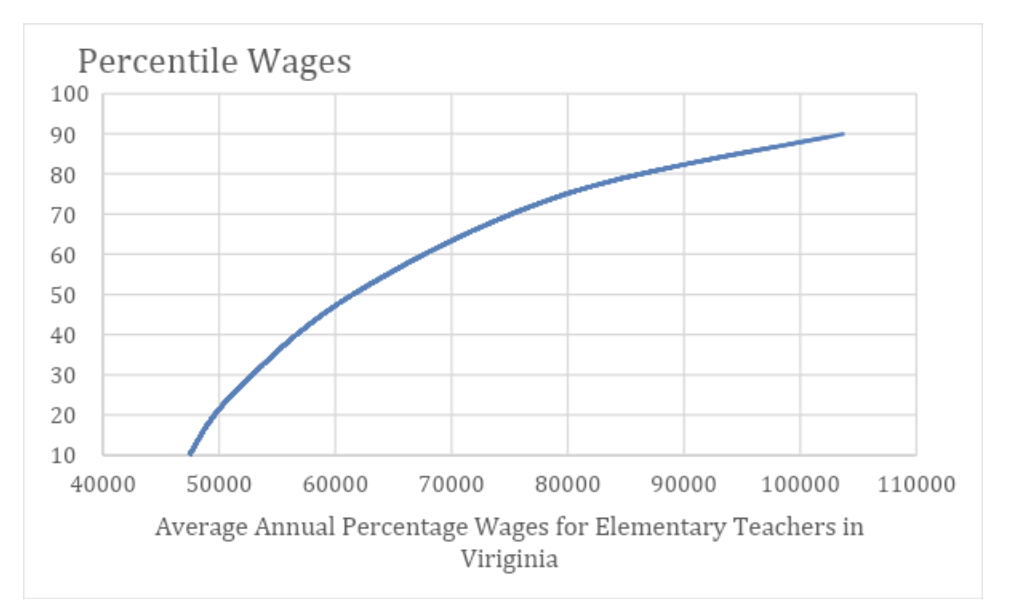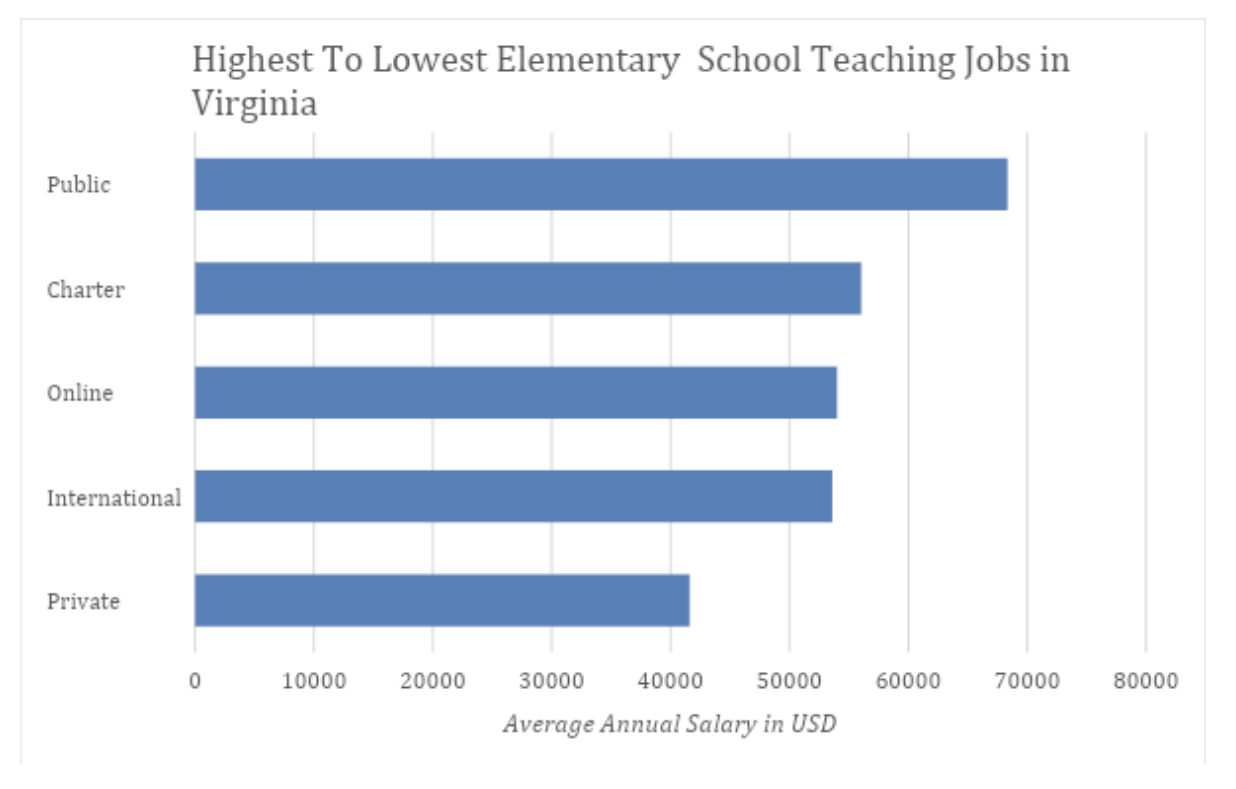Elementary teachers are a formative influence on children’s lives. In addition to providing the foundations of learning, they help shape their student’s self-esteem, confidence, self-worth, and ability to form bonds. But Virginia is desperate for more quality teachers. The Daily Progress reported that the state’s vacancy rate has grown yearly since 2020.
The average elementary teacher salary in Virginia as of May 2023 was $68,340. Salary ranges can vary widely depending on the city and many other important factors, including education, certifications, additional skills, and the number of years you have spent in your profession.
In our guide, Teachers of Tomorrow answers how much an elementary teacher makes in Virginia. We’ll also walk you through the state’s pathways to becoming an elementary educator, including alternative teacher certification options.

What Is an Elementary Teacher?
Elementary school teachers teach grades K-5 and sometimes up to sixth. They are responsible for establishing the core subjects of learning. They also help children develop their social, hygiene, and motor skills.
In Virginia, children begin kindergarten if they turn 5 before or on September 30th of that school year. The students remain in elementary school until 9-12 years of age, depending on the district. They are typically taught in a self-contained classroom. Thus, elementary teachers instruct in a wide range of subjects, including reading, writing, science, and social studies.
Excellent elementary teachers come in a diverse range of personalities and teaching styles. However, successful educators of this age group share some characteristics, such as the following:
- Patient: Elementary students are emotionally immature and have naturally shorter attention spans than adults. Their listening and communication skills are still developing, so instructions must be given clearly and often repeated. Educators working with this age group need to remain calm and empathetic as their students do their best with where they are at.
- Energetic: Teaching elementary students requires go-go and limitless enthusiasm. Younger students are incredibly busy people. Life is still very exciting. The world feels fresh and new. They love to play, explore, and ask endless questions. Lessons and activities are still very physical, with arts and crafts, mat time, dancing, singing, and games. On the bright side, elementary school teachers don’t need to feel guilty for missing a workout at the gym.
- Creative: Elementary school teachers have to think outside the box in all aspects of teaching. They must come up with engaging and fun crafts and activities. They need to decorate and arrange their classroom in an inviting and cheerful way that meets various needs. They must also be able to modify lessons both during planning and implementation to ensure all students are engaged.
Elementary school teachers have many responsibilities. A few examples include:
- Adapting lessons and teaching methods to meet a range of learning styles.
- Communicate students’ progress and challenges to the necessary role players, including other parents and guardians.
- Develop lessons and activities that meet the curriculum standards set out by the Virginia Department of Education (VDOE)
How Much Do Elementary Teachers Make in Virginia?
The average annual salaries for elementary school teachers in Virginia as of May 2023, according to the Bureau of Labor Statistics:
- Highest salary – $103,810
- Average salary – $68,340
- Lowest salary – $47,430
Virginia elementary school teaching salaries are based on the school district’s budget and the teacher’s qualifications, years of experience, and additional skills.

How To Become an Elementary Teacher in Virginia
The steps to becoming an elementary teacher differ between US states. The VODE oversees Virginia’s certification and licensing pathways. For candidates taking the state’s traditional route, they will need to complete the following:
- Obtain a bachelor’s degree. All US states, including Virginia, require a bachelor’s degree to become a certified, full-time teacher. Candidates should select a college or university accredited by the VDOE.
- Complete a teacher preparation program: Most candidates on the traditional pathway attend the teacher preparation program at the same institution where they obtained their 4-year degree. Those who wish to change institutions must select a teacher education program approved by the VDOE.
- Gain Field Experience and Student Teaching Hours: Virginia 8VAC20-543-10 requires candidates to receive field experience and supervised student teaching of at least 150 hours, although some programs require more.
- Pass the required exams: Elementary school teachers must pass the relevant exams prescribed by the VDOE. These include Praxis tests for the candidate’s specific licensure areas. Note that exam requirements are always changing, and it is essential to stay up to date. For example, on April 8, 2024, Virginia’s governor approved a House Bill that eliminates the need for candidates to take the Virginia Communion and Literacy Assessment (VCLA) to qualify for initial licensure.
- Meet all Code of Virginia Statuary Requirements: VDOE has Statutory Licensure Requirements to qualify for Initial Licensure. These include the following:
- Dyslexia Training
- Child Abuse Recognition and Intervention Training
- Emergency First Aid, CPR & AED Certification or Training
- Behavior Intervention and Support Training
- Cultural Competency Training
Candidates must check with their preparation program provider to determine which certificates are included in their training and which must be obtained through a third-party program. Also, these requirements are subject to change, and it is essential to stay up to date with current requirements.
6. Apply for certification: Teaching candidates must use the Virginia Licensure Online (VALO) system to apply for their initial license. Use the VALO User Guide to learn how to navigate the portal, confirm what documentation is required, and access the fees page.
Alternative Route to Certification for Elementary School Teachers
Virginia has alternative routes to becoming a teacher for those who did not use the traditional pathway. These allow candidates to switch careers into education without obtaining a second bachelor’s degree.
Virginia Alternative Route to Licensure: Career Switcher
The Virginia Career Switcher pathway is for adults who have been working in other fields and want to change careers into education.
The program is run through certified program providers, composed of three Virginia universities and the Virginia Community College System (Educate Virginia).
To qualify, a candidate must:
- Have a bachelor’s degree or higher from an accredited college or university.
- Have worked at least three years fulltime since graduation.
- Achieve qualifying scores on the professional teacher’s assessments.
All certified programs must follow the VDOE general curriculum standards. However, the cost of the program and if it is held in-person, online, or a combination of the two depends on the provider.
Virginia Alternative Route to Licensure: Troops to Teachers (TTT) Virginia Center
Virginia is one of the handful of US states attempting to keep their Troops to Teachers program alive. Eligibility is for current and retired service members. Military spouses will need to inquire. Contact Troops to Teachers (TTT) Virginia Center at the William & Mary School of Education to learn more about the current process and available funding.
What is the Highest and Lowest Paying Elementary School Teaching Job?
As a certified elementary school teacher in Virginia, you can work in various settings:
- Public schools: Virginia public schools consistently offer the best elementary school teaching salaries. They receive local and state funding.
- Charter schools: Virginia charter schools do not have as much access to funding as the state’s public schools. Thus, teacher salaries are slightly less.
- Online teaching: Virginia remote teaching jobs are usually paid by the hour, providing teachers with flexible, part-time work. But those that work fulltime are paid better than the average private school teacher salary.
- International schools: International school pay is best in the higher grades. However, Virginia’s international schools pay better elementary teachers better than private schools, especially if a teacher has a special skill, teaches in a hard-to-fill subject area, or is fluent in a second language.
- Private schools: Private school salaries in Virginia elementary schools are the best and the least in the state. Since most funding comes through tuition fees, those that charge the highest rates are the most likely to pay their teachers the most.

At Teachers of Tomorrow, our mission is to support you as you strive toward becoming one of Virginia’s top elementary teachers. Don’t wait to make a difference in children’s lives. Begin your journey today!
Related Teaching Careers
What Does a Kindergarten Teacher Do: Requirements and Skill Sets
How Much Does a High School Teacher Make in Virginia
How to Teach Online in 2024 – The 7 Important Steps to Consider
Related Articles
What Does an Elementary School Teacher Do: Requirements and Skill Sets
How to Become a Teacher in Virginia
How Much Does an Elementary Teacher Make in Washington?


